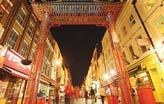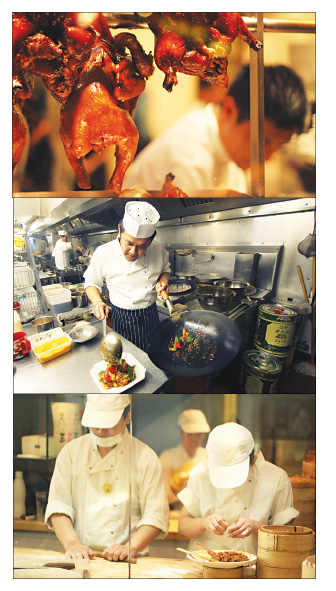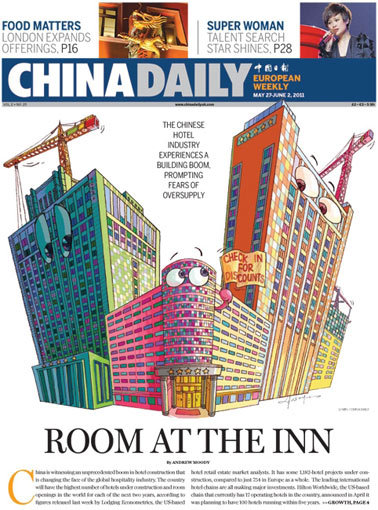Cuisine central
Updated: 2011-05-27 11:32
By Natasha Stokes (China Daily European Weekly)
|
|
London's Chinatown is helping diners appreciate full palate of Chinese food
Among the curlicue paifang arches and the steamy windows of all-you-can-eat buffets, a revolution of the tastiest sort is rippling through Chinatown in London. Once dominated by Cantonese restaurants and their Westernized counterparts, the area is now home to a growing number of eateries serving fare from all over China.
On Newport Court, Baozi Inn is a Northern Chinese restaurant opened by the group that operates the Sichuanese Bar Shu. A few months ago, the same group opened a tiny hawker food shop next door, selling the fish balls and meat skewers you would find in any Southeast Asian street stall.
Nearby is Jen's Cafe, a tiny diner where employees are as no frills as the dcor. It is an authentic reproduction of the food-first, service-second diners of China, down to the woman in the window deftly pinching out the restaurant's specialty - handmade Beijing dumplings, the thicker-skinned, meat-filled bruiser cousins of won tons that are commonplace in the north, where winter temperatures dive well below zero.
Then there is Leong's Legends, the Taiwanese place on Macclesfield Street so popular it spawned Leong's Legends Continue a couple streets over; next, Leong's Legend III in Bayswater. Opened by Leong's Group, the trio of restaurants serves a Taiwanese menu bolstered by street snacks and Cantonese dim sum classics.
Of course, in a city the size and cosmopolitan breadth of London, a quality Chinatown is no huge surprise - but those restaurants are branding themselves as purveyors of such specialized cuisine is.
Tom Welton is the director of Shaftesbury PLC, the property investment group that owns most of area where Chinatown is built, and which operates an all-you-need-know website about the food, restaurants and events.
"Certainly we have seen a huge diversification of the cuisines on offer in Chinatown," he says. "People are very well traveled these days and therefore more educated about the range of foods available to them."
Geoffrey Leong, executive director of Leong's Group, agrees that Londoners' palates have become more sophisticated in the last few years. There is clearly a niche for such specialized fare - yet there are also plenty of less trained palates to win over. His restaurants continue to walk that delicate line between serving enough authentic fare to warm the tummies of those far from their Asian homes, and enough of the familiar standards to lure European footfall.
|
|
"We capture a lot of tourism in Chinatown," he says. "When we opened, we explored street food from Taiwan and Hong Kong as well as London Chinatown classics, which I've always felt is very important."
"It's important to address the fact that this is a heritage itself - it's traditional, localized Chinese food from London," Leong says. Filleted meat for example, is a Western adaptation. So in another of the group's restaurants, Empress of Sichuan, steamed fish is brought to the table whole, but deboned in front of customers.
It is a formula that has helped bring European diners in flocks - after all, for any trend to hit the mainstream, the local market has to be involved. Leong most recently opened Dumplings' Legend, where the eponymous dumplings are taken to new fusion highs, with one particular sort flavored with truffles.
He observes that Western and Chinese people approach food in rather different ways, particularly in business. "I think Londoners have always been biased toward what they perceive as glamorous locations, while Chinese tend to pick the restaurant to eat the best dish they can get," he says.
Leong's Group restaurants seem to strike the right balance between food and mood - Leong's Legends is modeled after classic teahouses, while Dumplings' Legend is strikingly minimalist with a large open kitchen and fresh white walls.
Increasing local food savvy isn't limited to less familiar regional Chinese cuisine either. Classic Cantonese restaurants are also getting recognition for good food that goes beyond the mainstays of crispy duck and sweet and sour something - though nor do these leave the menu entirely.
Four Seasons is a stalwart of Canton dining and self-described BBQ specialist that opened four and a half years ago in Chinatown; its Queensway branch has been going for over 20. Despite staunchly maintaining its old-school dcor, the roast duck dripping in secret marinade means the deceptively unassuming restaurant is no longer only a haunt for Chinese people in the know.
"We used to be well-known only to Asians - now a lot more English know about us," manager Joe Yau says. "We now have about 30 percent European customers to 70 percent Asian, and the European customers know much better what to order."
Yau has been with the restaurant since its opening, and part of his job today includes making it easier for people less familiar with Cantonese cuisine to order off-piste items - the staff may suggest doumiao or soy bean shoots to the familiar bak choy for example.
Yau also observes that Chinatown is now home to a more diverse range of restaurants, a change he attributes to increased demand from more students arriving from the Chinese mainland.
London's Chinatown began coalescing where it is now in the late 1960s and by the 1970s had developed into a small but bustling center of the Chinese community. In 1978, the London Chinatown Chinese Association (LCCA) was formed to look after the interests of local businesses and enhance the area's appearance. The overtly Oriental architecture you see today - the arches at either end of Gerrard Street, the pagoda near Newport Court - come from the LCCA.
"In the old days, restaurants mainly served Cantonese cooking because the immigrants were largely from Hong Kong," says president Leslie Ng.
"For the last 10 years, Chinese cuisine has diversified - and it's still changing - because we have more immigrants and students from all parts of China."
As China opens its borders to travelers, more Brits also experience more of what the mainland has to offer and they return with new tastes.
"We have Fujian, Sichuan, Hunan ... Slowly, slowly Chinatown will change even more in the next 10 years to include more cuisines from China," Ng says.
Of course, it helps that Chinatown is big business in London. Over 4,000 to 5,000 people are employed in the businesses of the few streets it covers. The place is bustling and attractive to locals, students and visitors alike. This Chinese New Year, an estimated 500,000 thronged the streets for the annual celebrations put on by the LCCA.
The organization is moving forward with a project, working with the Prince's Foundation, a trust set up by the Prince of Wales for architecture that promotes human values. An official Chinatown culture center is in the works, with an expected unveiling date in 2013. On board is Sir David Tang, the entrepreneur who founded the Shanghai Tang clothing chain, as well as fine-dining restaurant China Tang in the Dorchester Hotel.
"Prince Charles came (to meet us) three years ago," Ng says. "He wants London's Chinatown to be the best in the world." Planned to include a theater and exhibition center with ongoing regular events, that lofty goal may not be so far off, as Chinatown becomes a destination for people looking for, as Ng says, more than duck - and indeed, more than Cantonese.
E-paper

Tapping into the future
Foreign companies are investing in China's water industry as many predict a growing profit margin.
Headhunters ride on growth
Commercial property rides wave
Learning from the past
Specials

Cuisine central
London's Chinatown is helping diners appreciate full palate of Chinese food

Tying the knot
Danish couple's high-end macrame export business takes off in the mountains of Yunnan.

Truly a super woman
Li Yuchun first came to prominence in 2005 as the Super Girl winner, and since then has become an international star.


